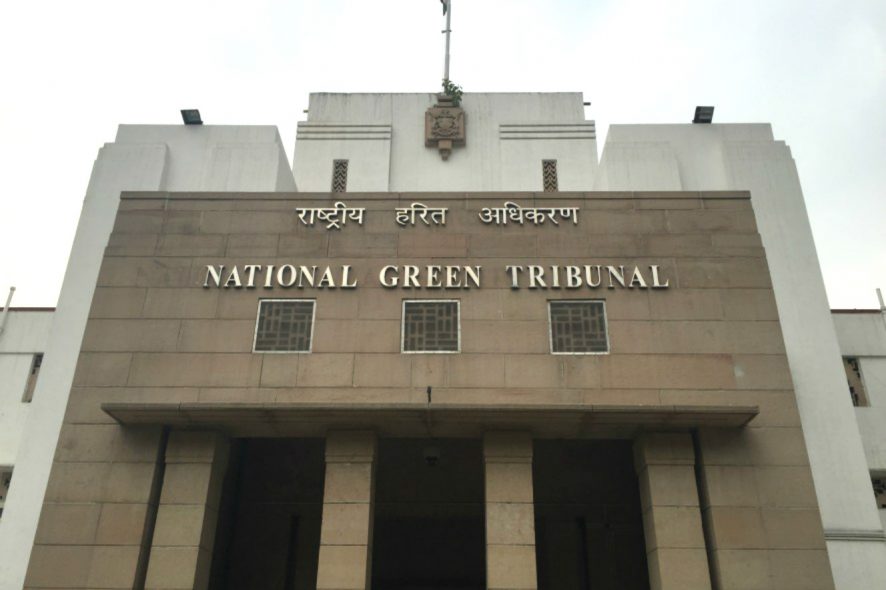National Green Tribunal (NGT): Full Bench of Justice Adarsh Kumar Goel (Chairperson), Justice Sheo Kumar Singh (Judicial Member) and Dr Nagin Nanda (Expert Member) while addressing the present review application observed that,
“For testing the correctness of a policy, the appropriate forum is Parliament and not the courts.”
By the present application, a review of the tribunal’s 06-05-2020 Order has been sought.
Background of the Original Application
Original Application was filed with the prayer to direct the respondent authorities to take appropriate legal action against the unnamed RMC plant operating within the Rajokri Protected Forest area and to direct the respondent authorities to formulate and place on record strategy/scheme to prevent any such encroachments upon the Rajokri Protected Forest land.
Report | RMC plant in private land
As per the report submitted by PCCF, the RMC plant was situated in private land and in compliance with the order of Tribunal, the authorities visited and inspected the site and the illegal structure was removed. The area has also been protected by the construction of barbed wire fencing.
Hence the relief sought by the applicant was fulfilled and therefore the application was disposed of.
Why the review application has been filed?
Now, in the relief clause of the review application, clause B the applicant has prayed to direct the respondent’s 1 to 3 to submit an appropriate report on the issues raised in para 8.6 of the Original Application.
Analysis
Tribunal of Court can intervene when there is violation of Fundamental Rights guranteed under the Constitution of India, violation of any provisions of Constitution of India, failure to confirm to the statute under which it is made or exceeding the limits of authority conferred by the enabling act and nothing has been shown by the applicant as to what Fundamental Right of the applicant had been violated.
Policy Decision
Tribunal states that, Construction of the road, development of the colony and the movement, all are policy matters and which is well-settled that the Courts or Tribunal in the exercise of their power of judicial review do not ordinarily interfere with the policy decisions of the executive unless the policy can be faulted on the grounds of mala-fide on reasonableness or unfairness, etc.
When can review jurisdiction be exercised?
The entire concept of writ jurisdiction is founded on equity and fairness and if the Court has committed a mistake, it should be removed entertaining a review application so that the result may not lead to a miscarriage of justice, as rectification of order stems from the fundamental principles that justice is above all.
Provisions of Order XLVII Rule 1, CPC permits the review even on the mistake of fact or even on ignorance of material fact.
Law of Review
The law of review can be summarised that it lies only on the grounds mentioned in O. 47 R. 1CPC. The party must satisfy the Court that the matter or evidence discovered by it at a subsequent stage could not be discovered or produced at the initial stage though it had acted with due diligence.
Under the garb of review, a party cannot be permitted to re-open the case and to gain a full-fledged inning for making submissions, nor review lies merely on the ground that it may be possible for the Court to take a view contrary to what had been taken earlier.
When can a Tribunal or Court recall an order?
Tribunal noted the followings scenarios in which the Order can be recalled:
(i) the proceedings culminating into an order suffer from the inherent lack of jurisdiction and such lack of jurisdiction is patent,
(ii) there exists fraud or collusion in obtaining the judgment,
(iii) there has been a mistake of the court prejudicing a party or
(iv) a judgment was rendered in ignorance of the fact that a necessary party had not been served at all or had died and the estate was not represented.
Decision
In the present matter, the policy matter with regard to the construction of the road or existence of road or movement of the road is the policy matters in which the tribunal cannot intervene.
It is neither within the domain of the courts nor the scope of judicial review to embark upon an enquiry as to whether a particular public policy is wise or whether better public policy can be evolved.
Further, the tribunal added that,
Wisdom and advisability of economic policy are ordinarily not amenable to judicial review.
When can a Court interfere in a policy decision of the Parliament/State Legislatures/Governments:
(I) If the policy fails to satisfy the test of reasonableness, it would be unconstitutional.
(II) The change in policy must be made fairly and should not give impression that it was so done arbitrarily on any ulterior intention.
(III) The policy can be faulted on grounds of mala fide, unreasonableness, arbitrariness or unfairness, etc.
(IV) If the policy is found to be against any statute or the Constitution or runs counter to the philosophy behind these provisions.
(V) It is dehors the provisions of the Act or Legislations.
(VI) If the delegate has acted beyond its power of delegation.
Hence in view of the above, the present review application was not maintainable and therefore dismissed. [Mall Road, Vasant Kunj RWA, Delhi v. Ministry of Environment, Forest & Climate Change; 2020 SCC OnLine NGT 230, decided on 22-09-2020]






